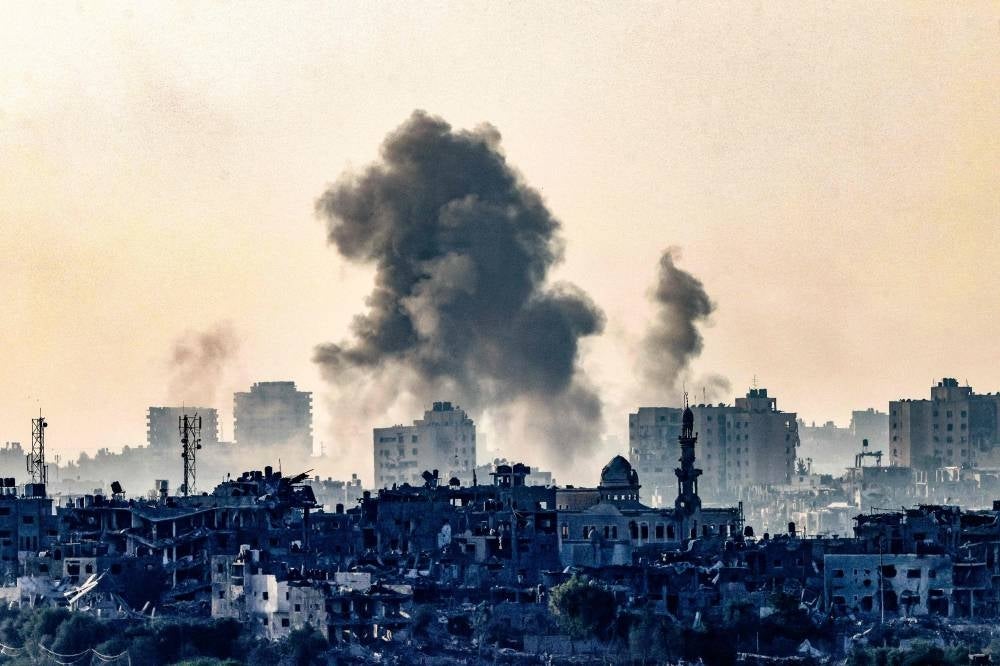Gazans cook with firewood as Israeli airstrikes, fuel shortage force closure of bakeries

GAZA - In Gaza's Rafah city, Nedal al-Ashqar and his wife Wafaa cooked a family meal with firewood, despite the fear that Israeli aerial surveillance could mistake the smoke as a military target.
"We have some flour, enough for two weeks, but we don't have enough gas and electricity to bake them," said the couple newly move from al-Shujaeya, a populous neighborhood in Gaza City to escape the heavy Israeli bombardment.
"Mostly, I'm worried that an Israeli fighter jet may attack our house because of the smoke raised from the firewood," al-Ashqar said. "Even if we survive an attack, I don't have enough cash to buy more flour."
For more than two weeks, heavy Israeli airstrikes have decimated communities and neighborhoods across the Gaza Strip, leading to heavy civilian casualties, and the 2.3 million Palestinians there were cut off supplies and plunged into an abject scarcity of necessary goods.
The situation in the Gaza Strip is extremely catastrophic amid continuous Israeli air raids, power outage and minimal water supplies, said Enas Hamdan, acting director of the United Nations Agency's Information and Communication Office in Gaza.
Ahmed Nassar, a Palestinian father-of-four newly displaced by the war, said "we managed to buy some bread from a bakery for my family after five hours of waiting, but the amount is barely enough for each one of us."
"Sometimes, we can't even buy a single loaf of bread," the father-of-four who fled from Gaza's al-Zaytoun to Deir al-Balah city, south of Khan Younis, told Xinhua.
Usually, his family needs four kilos of bread to get by a day. But now, three meals were cut into one.
Nassar said while waiting in front of the bakery, he could still hear heavy explosions from nearby places bombed by Israeli aircraft.
"I am really afraid of losing my life. Dozens of people had been unlucky just because they were in the wrong place at a wrong time... my children need me to stay alive," he lamented.
For 18 days in a row, Israel's large-scale airstrikes have been going on against the coastal enclave, after Gaza-ruling Hamas fighters carried out an unprecedented operations at Israel on Oct 7.
The death toll of Palestinians from Israeli airstrikes on the Gaza Strip has risen to 6,546, according to the latest update by the Hamas-run Health Ministry.
On Wednesday, 10 Palestinians were killed in an aircraft bombardment on "the only bakery" in the al-Mughazi refugee camp in central Gaza, said Salama Maarouf, head of the Hamas-run government media office in Gaza, in a statement.
"The new crime provides new evidence of Israel's deliberate targeting of gatherings of citizens in front of bakeries and markets," Maarouf claimed.
Currently, only four of the 24 bakeries contracted by the United Nations Relief and Works Agency for Palestine Refugees in the Near East (UNRWA) are still supplying bread to shelters, said the Gazan official, warning that most bakeries might close soon if fuel is not allocated to them.
"We need safe places in Gaza to provide food to Palestinian families, and such safety needs international guarantees to prevent the occupation power from targeting these areas," Shady Salha, a Rafah-based lawyer, told Xinhua.
Locals who separately spoke to Xinhua said the hope for alleviating the humanitarian crisis remains faint since there has yet to be any foreseeable truce, nor signs for the food and necessities to resume inflow into Gaza.
"The conditions inside Gaza are truly catastrophic," World Food Program Executive Director Cindy McCain said as the first convoy of aids entered Gaza from Rafah crossing with Egypt on Oct. 21.
"The 20 trucks are an important first step, but this convoy must be the first of many," McCain said.
"We must also have continued and safe access for humanitarian workers and civilians inside Gaza so that we can get this food to people in need." - XINHUA










